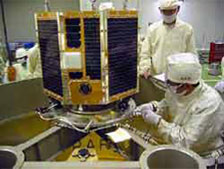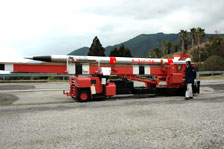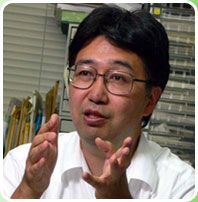
Q. What do you think about JAXA's announcement that it will support small satellite launches?
I think it's great, and we are now preparing an application. Russia has been assisting with our nanosatellite launches, but we have to deal with so much red tape and high travel costs. If domestic launches become possible, I think that many more will consider satellite development. JAXA's invitation is significant, and it will encourage more people to enter the small-satellite field. Although they are accepting only domestic applications for now, I hope that other countries' satellites will be launched in Japan someday. By helping each other we can establish a network, which will allow us to further enhance space development.
I'd like JAXA to continue this project by all means. Even if the first launch doesn't go as smoothly as we all hope, we shouldn't be discouraged by that. I am really looking forward to this opportunity.
Q. What's your impression of the relationship between JAXA and universities?

JAXA's demonstration satellite µ-LabSat No.1

The sounding rocket S-310-36 was used for experiments for Furoshiki Satellite(Courtesy of Intelligent Space Systems Laboratory)

|
I think that it's very good now. In 2002, we had a successful technological experiment on JAXA's small satellite µ-LabSat, which they launched. Other collaborations are also in progress, such as the Furoshiki satellite deployment experiment on JAXA's sounding rocket S-310, the CubeSat's communication system's test using a balloon, and radiation and thermal vacuum tests conducted by our laboratory using their facilities. I'm hoping that we will maintain this relationship and some day collaborate on research to generate some synergy effect. There are many prominent researchers at JAXA. Working together, I think we can achieve significant synergy, where one plus one becomes three or four. And the results can be demonstrated on our nanosatellites being launched more frequently, perhaps every one or two years. I'd like to see this happen.
Q. What is the role of universities in space development in your opinion?
We have launched a non-profit organization, UNISEC, the University Space Engineering Consortium, to support practical space development, such as production of satellites and rockets, in universities and colleges, and also to strengthen human resources. I was the vice administrator until last year, and I believe that what UNISEC is trying to do shows the important role that universities can play in space development.
There are various phases in the development of technology. The seed of a new technology is often found through trial and error. Then, as a variety of new ideas are generated, those with high potential are selected, budgeted and developed. You need a lot of people for this preliminary phase, and it will probably be difficult to meet demand with only JAXA staff, so I hope that universities will be given a chance to participate. Asking for an opportunity also means asking for a budget for research and development. It doesn't have to be a large amount, but enough to allow universities to develop the seeds of new technologies. And hopefully, JAXA will recognize and select high-potential ideas for implementation. Universities are full of resources, with a lot of students, professors and instructors, and ideas that can be exploited.
JAXA is supporting UNISEC's activities in various ways, from offering their test facilities to holding technology workshops. Ideally our relationship will grow even closer in the future, with UNISEC managing part of JAXA's operation, such as developing human resources.
To make this happen, I think it's important for universities to enhance their development of technology and human resources, so that we can contribute to the field of space development. The potential is definitely there. For example, it takes about ten years to develop and launch a large-scale satellite, which means that one can be involved in only two or three satellites in one's career. On the other hand, students usually join my laboratory in their fourth year, and experience the entire process, before they complete their masters or Ph.D. Some students have launched two satellites in six years even before graduation. From the point of view of human-resource development, the key is to shorten the satellite mission cycle. The more experience students have in satellite launches, the greater the contribution they will be able to make to practical space development.
|